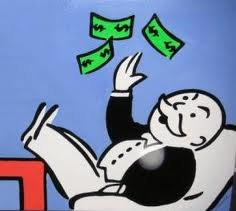Nobody with a pulse can deny that there’s been an ongoing, heated argument in politics and pop-culture that pits “the rich” against “the poor,” the flames of which have been fanned by the Occupy Wall Street (OWS) movement. OWS supporters would have you believe that they’re fighting for the rights of the worker class against the perceived abuses of the “elite.” “Class warfare” it’s being called in some circles. Really? Is it really wealth envy that’s driving this argument? Or is it really a coming tipping point in a centuries-old philosophical discussion regarding the merits of Capitalism vs. Socialism?
Which is fair? Socialism or Capitalism?
There are elements of our society (the “99%”, the OWS crowd, and our current President among them) who would have you believe it’s Socialism.
They would have you believe that in a world where any one person (or group) has the skills, creativity, and bravery to do something extraordinary, that it’s somehow immoral for them to be able to profit from it. And if they should find a way to profit from it, then it’s the government’s duty to force them to “share” that profit with those who possess neither the skills, creativity, nor gumption to attempt anything even remotely exceptional with their lives. That just their mere existence qualifies them as a recipient of the spoils of someone else’s exceptionalism. In other words, they are entitled to impose on someone else’s time, skills, and resources without ever having done anything to earn it.
In the world of Socialism, where’s the motivation for the talented to make such an effort? If I know that any extra effort on my part will only benefit someone else, why should I make that effort? Sure I care about people and will go out of my way to help them – IF I feel that they’re deserving of my efforts. But I’m not gonna go out & build a multimillion dollar business for someone else.
In fact, statistics prove that employees tend to do only as much work as is required to keep them from being fired. (For proof, just google “how much effort employees,” “shirking,” and “propensity to withhold effort.”) Unless there’s some personal incentive in it for them, they’ll not expend the extra effort (talent) to accomplish better results for their employer.
Therefore, I would argue that Capitalism is a better (fairer) plan.
When a risk-taker is sufficiently motivated by unlimited rewards (even acknowledging that the risk of great loss exists), they’ll expend their time, effort, talent, skills, and creativity to accomplish what has (up to that time) been deemed impossible.
Those vast rewards are realized when the market place determines that Mr. Risk Taker has created something of value and is willing to pay him for it. Of course certain economic conditions will determine exactly how valuable it is, and therefore, how much the general population is willing to pay for it.
How is this fairer for everyone else, you ask?
First, it’s fair that they receive sufficient value for the money spent on Mr. Risk Taker’s goods or services.
Second, it’s especially fair if Mr. Risk Taker is unable to fulfill all the duties required to meet market demand and is forced to hire others to help.
Under Capitalism, we love and value our “worker bees.” Somebody’s gotta drive the trucks, run and/or maintain the machines, sweep the floors, type the letters, keep the financial books in order, tend the landscaping, plant & harvest the produce, take our blood pressure, tend to our ailments and healing, etc. The employer who not only provides value to the public, but provides sufficient reward to his valuable worker bees, will have some loyal and hard-working employees.
People would rather have jobs than welfare. So those who are rewarded with good jobs have higher self-esteem knowing they’re providing for themselves (and their families). Especially if they have employers who show appreciation through good pay and other intrinsic rewards. In this way, Capitalism is valuing and honoring the population at large: Mr. Working Man.
Lastly, it’s fair because, as Margaret Thatcher said, “The problem with Socialism, is that eventually you run out of other people’s money.” “Social programs” are paid for via taxes. If more and more people are “benefiting” from these social programs, then fewer and fewer are paying for them. Why is it deemed more moralistic to demean large portions of the population by forcing them to be recipients of “social” help than it to give them a job in which they can take pride for being a productive citizen?
In summary, it’s Capitalism that provides:
- the incentive to the risk taker,
- the free market that determines whether that risk taker thrives or fails,
- the free market that determines that the employers who value and honor their employees will not only thrive but reap greater rewards,
- pride of productivity and self-worth for the working man,
- and revenues to pay for the necessary operations of government, and the existential operations of social programs for those with true needs.









